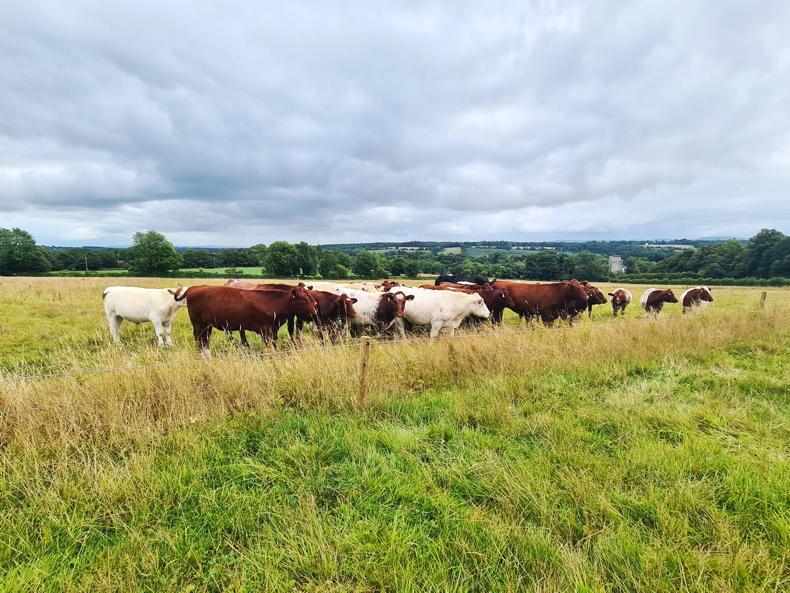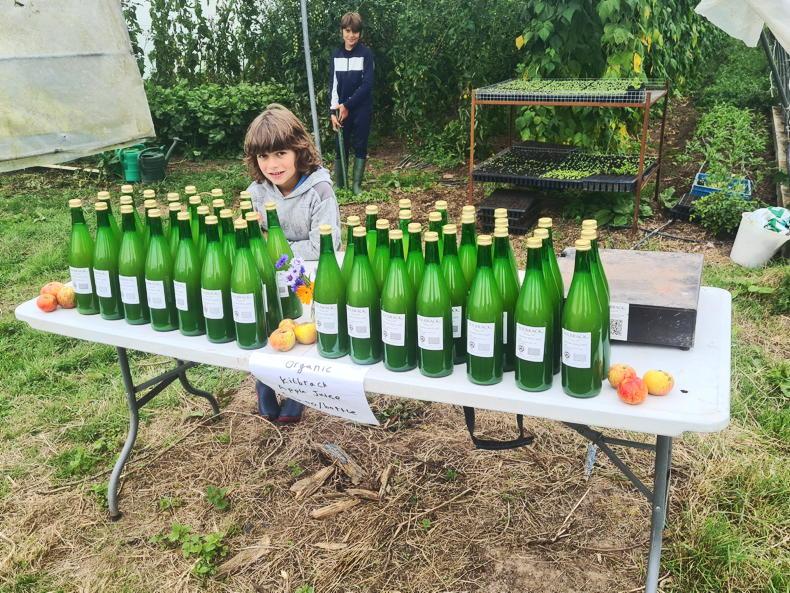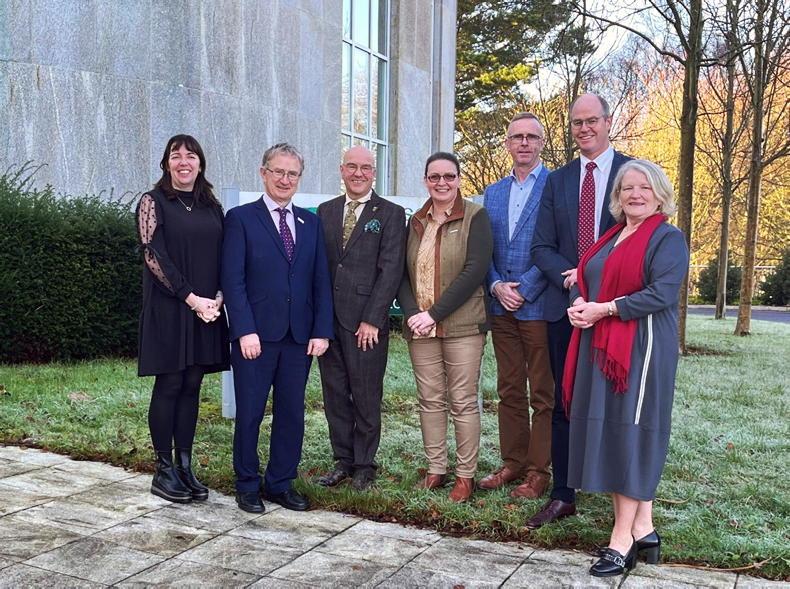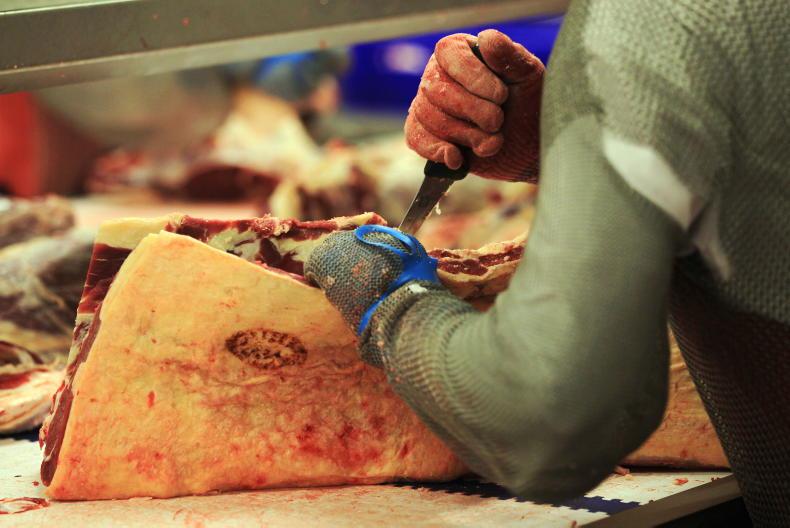A farmer’s life is a busy one, there are always jobs to be done. Particularly so, if you’re growing over 30 different organic crops, direct-selling produce to over 20 restaurants, keeping a herd of Shorthorn cattle, hosting scores of farm helpers and rearing three young children. Such is the lot of Patrick Frankel and his partner Judith, whom I had the great pleasure of visiting recently at Kilbrack Organic Farm, near Doneraile.
In spite of this hectic life, Patrick is a refreshingly reflective farmer.
“Everything is a choice,” he muses and, when he looks back on his life, Patrick wants to know that he has chosen to live purposefully.
For Patrick, this means being “in the moment”, appreciating his opportunity as a farmer to work closely with nature, continually learning ways to produce diverse, nutritious food, all the while affording his children a childhood to cherish.

Patrick Frankel and his son Thomas at Kilbrack Organic Farm.
Learning the ropes
Patrick studied Zoology and Embryology in college. Once, on a visit home, his parents (who bought the farm in the early 1970s) suggested he try to sell some of the excess apples from the farm’s walled garden. Patrick duly went down to the Coal Quay farmers’ market in Cork, really enjoyed the “buzz” of doing business and, long-story-short, discovered a new purpose in life.
A one-year commercial horticulture course with “charismatic” Jim Cronin provided a foundational learning experience in organic growing techniques, supplemented by visits to other growers and online research.
But Patrick’s best learning strategy remains one of “trial and error”, continually trying new things (from crop varieties to natural manures) and observing the result. After all, the only real failure is not learning from your mistakes. The initial aim was to grow enough produce to “fill out” his market stall, but this soon led to connections with restaurants, which are his main customers today.
The six-acre market garden produces a year-round supply of salad leaves, courgettes, potatoes (the Connect variety, favoured for blight resistance), spinach, broccoli, leeks, kale and more.
Herbs like mint and thyme, and fruit like blueberries, gooseberries, blackcurrants, raspberries, even figs and chokeberries.
All restaurant orders are made via WhatsApp and marked-in on a huge whiteboard (20+ rows of suppliers x 30+ columns of produce) in the packing shed. Tuesday is harvest and packing day, Wednesday is for deliveries, Saturday for top-ups.
Every other day is prepping, planting, weeding, watering – a myriad of tasks in the indoor (four polytunnels) and outdoor spaces.

Patrick’s herd of shorthorn beef cattle with a new hedgerow in the foreground.
Farm diversification
Patrick’s customers are generally loyal, some with him for over a decade, though a 10-15% annual attrition rate reflects the pressure this sector is currently under. One attraction is Patrick’s propensity to supply unusual produce – everything from Jerusalem artichokes to vile-tasting cardoon leaves – offering chefs a welcome creative challenge.
A beautiful herd of Shorthorn cattle graze and grace the farm’s 85 acres of pasture. Expansive fields currently being subdivided by new ACRES-funded hedges.
Patrick sources stock locally as weanlings and finishes them on grass only, selling them via the Good Herdsman, averaging €1,650 each.
The cattle are housed on straw, the manure providing vital nutrients for the market garden.
Adding to the farm’s diversity, Patrick has 35 acres of native woodland and a five-acre, 360-apple-tree orchard, with generous tree-spacing allowing intercropping with vegetables or with grass for silage.
While nature abounds on the farm – old buildings, towering trees, flourishing hedgerows, dedicated pollinator beds and even a new pond (a “source of peace”) – providing ample habitat, what’s perhaps most striking is the farm’s social footprint.

James Frankel selling some of the farm’s 1,200 bottles of apple juice.
For courses on organic market gardening, visit www.nots.ie, where you will also find details of a new MSc in Organic and Biological Agriculture at the South East Technical University (SETU). The next intake for course modules is this September.Top tips
“Build a pond near your house. I reckon it will make you live longer!”
“Start growing your own food. No matter the scale, it’s good for the body and soul.”

The Frankels share their home with large numbers of volunteers from Willing Workers On Organic Farms each year.
Farm facts
Name: Patrick Frankel.Farm type: Market gardening, beef.Farm size: 60ha.Focus: Working the land with awareness, sensitivity and respect. Schemes: Organics, ACRES.
A farmer’s life is a busy one, there are always jobs to be done. Particularly so, if you’re growing over 30 different organic crops, direct-selling produce to over 20 restaurants, keeping a herd of Shorthorn cattle, hosting scores of farm helpers and rearing three young children. Such is the lot of Patrick Frankel and his partner Judith, whom I had the great pleasure of visiting recently at Kilbrack Organic Farm, near Doneraile.
In spite of this hectic life, Patrick is a refreshingly reflective farmer.
“Everything is a choice,” he muses and, when he looks back on his life, Patrick wants to know that he has chosen to live purposefully.
For Patrick, this means being “in the moment”, appreciating his opportunity as a farmer to work closely with nature, continually learning ways to produce diverse, nutritious food, all the while affording his children a childhood to cherish.

Patrick Frankel and his son Thomas at Kilbrack Organic Farm.
Learning the ropes
Patrick studied Zoology and Embryology in college. Once, on a visit home, his parents (who bought the farm in the early 1970s) suggested he try to sell some of the excess apples from the farm’s walled garden. Patrick duly went down to the Coal Quay farmers’ market in Cork, really enjoyed the “buzz” of doing business and, long-story-short, discovered a new purpose in life.
A one-year commercial horticulture course with “charismatic” Jim Cronin provided a foundational learning experience in organic growing techniques, supplemented by visits to other growers and online research.
But Patrick’s best learning strategy remains one of “trial and error”, continually trying new things (from crop varieties to natural manures) and observing the result. After all, the only real failure is not learning from your mistakes. The initial aim was to grow enough produce to “fill out” his market stall, but this soon led to connections with restaurants, which are his main customers today.
The six-acre market garden produces a year-round supply of salad leaves, courgettes, potatoes (the Connect variety, favoured for blight resistance), spinach, broccoli, leeks, kale and more.
Herbs like mint and thyme, and fruit like blueberries, gooseberries, blackcurrants, raspberries, even figs and chokeberries.
All restaurant orders are made via WhatsApp and marked-in on a huge whiteboard (20+ rows of suppliers x 30+ columns of produce) in the packing shed. Tuesday is harvest and packing day, Wednesday is for deliveries, Saturday for top-ups.
Every other day is prepping, planting, weeding, watering – a myriad of tasks in the indoor (four polytunnels) and outdoor spaces.

Patrick’s herd of shorthorn beef cattle with a new hedgerow in the foreground.
Farm diversification
Patrick’s customers are generally loyal, some with him for over a decade, though a 10-15% annual attrition rate reflects the pressure this sector is currently under. One attraction is Patrick’s propensity to supply unusual produce – everything from Jerusalem artichokes to vile-tasting cardoon leaves – offering chefs a welcome creative challenge.
A beautiful herd of Shorthorn cattle graze and grace the farm’s 85 acres of pasture. Expansive fields currently being subdivided by new ACRES-funded hedges.
Patrick sources stock locally as weanlings and finishes them on grass only, selling them via the Good Herdsman, averaging €1,650 each.
The cattle are housed on straw, the manure providing vital nutrients for the market garden.
Adding to the farm’s diversity, Patrick has 35 acres of native woodland and a five-acre, 360-apple-tree orchard, with generous tree-spacing allowing intercropping with vegetables or with grass for silage.
While nature abounds on the farm – old buildings, towering trees, flourishing hedgerows, dedicated pollinator beds and even a new pond (a “source of peace”) – providing ample habitat, what’s perhaps most striking is the farm’s social footprint.

James Frankel selling some of the farm’s 1,200 bottles of apple juice.
For courses on organic market gardening, visit www.nots.ie, where you will also find details of a new MSc in Organic and Biological Agriculture at the South East Technical University (SETU). The next intake for course modules is this September.Top tips
“Build a pond near your house. I reckon it will make you live longer!”
“Start growing your own food. No matter the scale, it’s good for the body and soul.”

The Frankels share their home with large numbers of volunteers from Willing Workers On Organic Farms each year.
Farm facts
Name: Patrick Frankel.Farm type: Market gardening, beef.Farm size: 60ha.Focus: Working the land with awareness, sensitivity and respect. Schemes: Organics, ACRES. 












SHARING OPTIONS